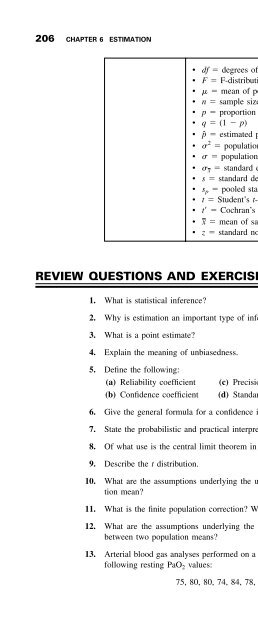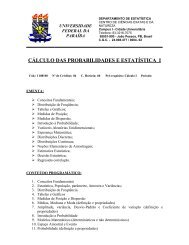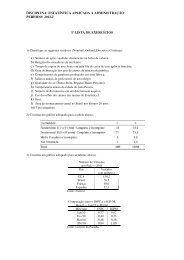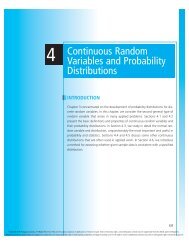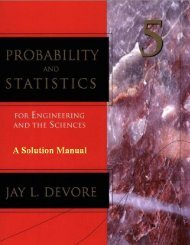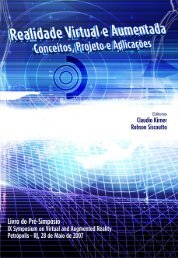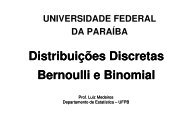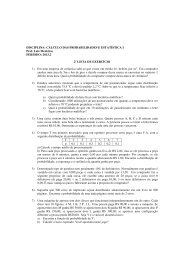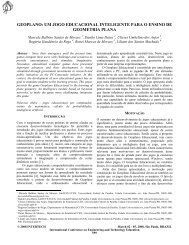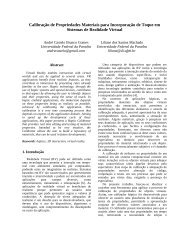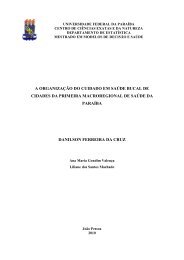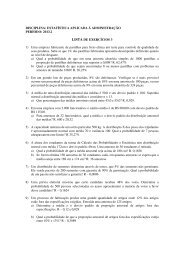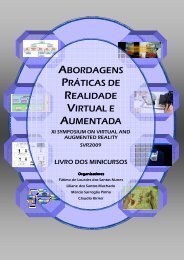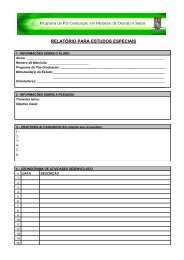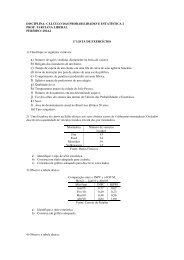- Page 1:
LibraryPirate
- Page 6:
PUBLISHER ACQUISITIONS EDITOR ASSOC
- Page 10:
This page intentionally left blank
- Page 14:
vi PREFACE Chapter 1 Introduction t
- Page 18:
viii PREFACE Edward Danial David El
- Page 22:
x CONTENTS 6.3 The t Distribution 1
- Page 26:
This page intentionally left blank
- Page 30:
2 CHAPTER 1 INTRODUCTION TO BIOSTAT
- Page 34:
4 CHAPTER 1 INTRODUCTION TO BIOSTAT
- Page 38:
6 CHAPTER 1 INTRODUCTION TO BIOSTAT
- Page 42:
8 CHAPTER 1 INTRODUCTION TO BIOSTAT
- Page 46:
10 CHAPTER 1 INTRODUCTION TO BIOSTA
- Page 50:
12 CHAPTER 1 INTRODUCTION TO BIOSTA
- Page 54:
14 CHAPTER 1 INTRODUCTION TO BIOSTA
- Page 58:
16 CHAPTER 1 INTRODUCTION TO BIOSTA
- Page 62:
18 CHAPTER 1 INTRODUCTION TO BIOSTA
- Page 66:
20 CHAPTER 2 DESCRIPTIVE STATISTICS
- Page 70:
22 CHAPTER 2 DESCRIPTIVE STATISTICS
- Page 74:
24 CHAPTER 2 DESCRIPTIVE STATISTICS
- Page 78:
26 CHAPTER 2 DESCRIPTIVE STATISTICS
- Page 82:
28 CHAPTER 2 DESCRIPTIVE STATISTICS
- Page 86:
30 CHAPTER 2 DESCRIPTIVE STATISTICS
- Page 90:
32 CHAPTER 2 DESCRIPTIVE STATISTICS
- Page 94:
34 CHAPTER 2 DESCRIPTIVE STATISTICS
- Page 98:
36 CHAPTER 2 DESCRIPTIVE STATISTICS
- Page 102:
38 CHAPTER 2 DESCRIPTIVE STATISTICS
- Page 106:
40 CHAPTER 2 DESCRIPTIVE STATISTICS
- Page 110:
42 CHAPTER 2 DESCRIPTIVE STATISTICS
- Page 114:
44 CHAPTER 2 DESCRIPTIVE STATISTICS
- Page 118:
46 CHAPTER 2 DESCRIPTIVE STATISTICS
- Page 122:
48 CHAPTER 2 DESCRIPTIVE STATISTICS
- Page 126:
50 CHAPTER 2 DESCRIPTIVE STATISTICS
- Page 130:
52 CHAPTER 2 DESCRIPTIVE STATISTICS
- Page 134:
54 CHAPTER 2 DESCRIPTIVE STATISTICS
- Page 138:
56 CHAPTER 2 DESCRIPTIVE STATISTICS
- Page 142:
58 CHAPTER 2 DESCRIPTIVE STATISTICS
- Page 146:
60 CHAPTER 2 DESCRIPTIVE STATISTICS
- Page 150:
62 CHAPTER 2 DESCRIPTIVE STATISTICS
- Page 154:
64 CHAPTER 2 DESCRIPTIVE STATISTICS
- Page 158:
66 CHAPTER 3 SOME BASIC PROBABILITY
- Page 162:
68 CHAPTER 3 SOME BASIC PROBABILITY
- Page 166:
70 CHAPTER 3 SOME BASIC PROBABILITY
- Page 170:
72 CHAPTER 3 SOME BASIC PROBABILITY
- Page 174:
74 CHAPTER 3 SOME BASIC PROBABILITY
- Page 178:
76 CHAPTER 3 SOME BASIC PROBABILITY
- Page 182:
78 CHAPTER 3 SOME BASIC PROBABILITY
- Page 186:
80 CHAPTER 3 SOME BASIC PROBABILITY
- Page 190:
82 CHAPTER 3 SOME BASIC PROBABILITY
- Page 194:
84 CHAPTER 3 SOME BASIC PROBABILITY
- Page 198:
86 CHAPTER 3 SOME BASIC PROBABILITY
- Page 202:
88 CHAPTER 3 SOME BASIC PROBABILITY
- Page 206:
90 CHAPTER 3 SOME BASIC PROBABILITY
- Page 210:
92 CHAPTER 3 SOME BASIC PROBABILITY
- Page 214:
94 CHAPTER 4 PROBABILITY DISTRIBUTI
- Page 218:
96 CHAPTER 4 PROBABILITY DISTRIBUTI
- Page 222:
98 CHAPTER 4 PROBABILITY DISTRIBUTI
- Page 226:
100 CHAPTER 4 PROBABILITY DISTRIBUT
- Page 230:
102 CHAPTER 4 PROBABILITY DISTRIBUT
- Page 234:
104 CHAPTER 4 PROBABILITY DISTRIBUT
- Page 238:
106 CHAPTER 4 PROBABILITY DISTRIBUT
- Page 242:
108 CHAPTER 4 PROBABILITY DISTRIBUT
- Page 246:
110 CHAPTER 4 PROBABILITY DISTRIBUT
- Page 250:
112 CHAPTER 4 PROBABILITY DISTRIBUT
- Page 254:
114 CHAPTER 4 PROBABILITY DISTRIBUT
- Page 258:
116 CHAPTER 4 PROBABILITY DISTRIBUT
- Page 262:
118 CHAPTER 4 PROBABILITY DISTRIBUT
- Page 266:
120 CHAPTER 4 PROBABILITY DISTRIBUT
- Page 270:
122 CHAPTER 4 PROBABILITY DISTRIBUT
- Page 274:
124 CHAPTER 4 PROBABILITY DISTRIBUT
- Page 278:
126 CHAPTER 4 PROBABILITY DISTRIBUT
- Page 282:
128 CHAPTER 4 PROBABILITY DISTRIBUT
- Page 286:
130 CHAPTER 4 PROBABILITY DISTRIBUT
- Page 290:
132 CHAPTER 4 PROBABILITY DISTRIBUT
- Page 294:
134 CHAPTER 4 PROBABILITY DISTRIBUT
- Page 298:
136 CHAPTER 5 SOME IMPORTANT SAMPLI
- Page 302:
138 CHAPTER 5 SOME IMPORTANT SAMPLI
- Page 306:
140 CHAPTER 5 SOME IMPORTANT SAMPLI
- Page 310:
142 CHAPTER 5 SOME IMPORTANT SAMPLI
- Page 314:
144 CHAPTER 5 SOME IMPORTANT SAMPLI
- Page 318:
146 CHAPTER 5 SOME IMPORTANT SAMPLI
- Page 322:
148 CHAPTER 5 SOME IMPORTANT SAMPLI
- Page 326:
150 CHAPTER 5 SOME IMPORTANT SAMPLI
- Page 330:
152 CHAPTER 5 SOME IMPORTANT SAMPLI
- Page 334:
154 CHAPTER 5 SOME IMPORTANT SAMPLI
- Page 338:
156 CHAPTER 5 SOME IMPORTANT SAMPLI
- Page 342:
158 CHAPTER 5 SOME IMPORTANT SAMPLI
- Page 346:
160 CHAPTER 5 SOME IMPORTANT SAMPLI
- Page 350:
CHAPTER6 ESTIMATION CHAPTER OVERVIE
- Page 354:
164 CHAPTER 6 ESTIMATION We will fi
- Page 358:
166 CHAPTER 6 ESTIMATION many insta
- Page 362:
168 CHAPTER 6 ESTIMATION Interval E
- Page 366:
170 CHAPTER 6 ESTIMATION Solution:
- Page 370:
172 CHAPTER 6 ESTIMATION someone wh
- Page 374:
174 CHAPTER 6 ESTIMATION Normal dis
- Page 378:
176 CHAPTER 6 ESTIMATION Yes Popula
- Page 382:
178 CHAPTER 6 ESTIMATION Construct
- Page 386: 180 CHAPTER 6 ESTIMATION By Equatio
- Page 390: 182 CHAPTER 6 ESTIMATION The proble
- Page 394: 184 CHAPTER 6 ESTIMATION error of t
- Page 398: 186 CHAPTER 6 ESTIMATION distributi
- Page 402: 188 CHAPTER 6 ESTIMATION EXAMPLE 6.
- Page 406: 190 CHAPTER 6 ESTIMATION since the
- Page 410: 192 CHAPTER 6 ESTIMATION age of per
- Page 414: 194 CHAPTER 6 ESTIMATION 6.9 CONFID
- Page 418: 196 CHAPTER 6 ESTIMATION FIGURE 6.9
- Page 422: 198 CHAPTER 6 ESTIMATION for s 2 ,
- Page 426: 200 CHAPTER 6 ESTIMATION f (x) 1.0
- Page 430: 202 CHAPTER 6 ESTIMATION the column
- Page 434: 204 CHAPTER 6 ESTIMATION SUMMARY OF
- Page 440: REVIEW QUESTIONS AND EXERCISES 207
- Page 444: REVIEW QUESTIONS AND EXERCISES 209
- Page 448: REVIEW QUESTIONS AND EXERCISES 211
- Page 452: REFERENCES 213 A-8. SILVIA IANNELO,
- Page 456: CHAPTER7 HYPOTHESIS TESTING CHAPTER
- Page 460: 7.1 INTRODUCTION 217 determine whet
- Page 464: 7.1 INTRODUCTION 219 to reject or n
- Page 468: 7.1 INTRODUCTION 221 8. Statistical
- Page 472: 7.2 HYPOTHESIS TESTING: A SINGLE PO
- Page 476: 7.2 HYPOTHESIS TESTING: A SINGLE PO
- Page 480: 7.2 HYPOTHESIS TESTING: A SINGLE PO
- Page 484: 7.2 HYPOTHESIS TESTING: A SINGLE PO
- Page 488:
7.2 HYPOTHESIS TESTING: A SINGLE PO
- Page 492:
7.2 HYPOTHESIS TESTING: A SINGLE PO
- Page 496:
EXERCISES 235 WOMAC mean function s
- Page 500:
7.3 HYPOTHESIS TESTING: THE DIFFERE
- Page 504:
7.3 HYPOTHESIS TESTING: THE DIFFERE
- Page 508:
7.3 HYPOTHESIS TESTING: THE DIFFERE
- Page 512:
7.3 HYPOTHESIS TESTING: THE DIFFERE
- Page 516:
7.3 HYPOTHESIS TESTING: THE DIFFERE
- Page 520:
EXERCISES 247 in healthy postmenopa
- Page 524:
EXERCISES 249 the local health depa
- Page 528:
7.4 PAIRED COMPARISONS 251 use of r
- Page 532:
percents from the postop percents.
- Page 536:
Paired T-Test and CI: C2, C1 Paired
- Page 540:
EXERCISES 257 Baseline Follow-up Ba
- Page 544:
7.5 HYPOTHESIS TESTING: A SINGLE PO
- Page 548:
EXERCISES 261 EXERCISES For each of
- Page 552:
7.6 HYPOTHESIS TESTING: THE DIFFERE
- Page 556:
7.7 HYPOTHESIS TESTING: A SINGLE PO
- Page 560:
7.7 HYPOTHESIS TESTING: A SINGLE PO
- Page 564:
7.8 HYPOTHESIS TESTING: THE RATIO O
- Page 568:
7.8 HYPOTHESIS TESTING: THE RATIO O
- Page 572:
7.9 THE TYPE II ERROR AND THE POWER
- Page 576:
7.9 THE TYPE II ERROR AND THE POWER
- Page 580:
7.9 THE TYPE II ERROR AND THE POWER
- Page 584:
7.10 DETERMINING SAMPLE SIZE TO CON
- Page 588:
SUMMARY OF FORMULAS FOR CHAPTER 7 2
- Page 592:
REVIEW QUESTIONS AND EXERCISES 283
- Page 596:
REVIEW QUESTIONS AND EXERCISES 285
- Page 600:
REVIEW QUESTIONS AND EXERCISES 287
- Page 604:
REVIEW QUESTIONS AND EXERCISES 289
- Page 608:
REVIEW QUESTIONS AND EXERCISES 291
- Page 612:
REVIEW QUESTIONS AND EXERCISES 293
- Page 616:
REVIEW QUESTIONS AND EXERCISES 295
- Page 620:
REVIEW QUESTIONS AND EXERCISES 297
- Page 624:
54. The objective of a study by Rei
- Page 628:
REFERENCES 301 REFERENCES Methodolo
- Page 632:
REFERENCES 303 Veins Due to Greater
- Page 636:
CHAPTER8 ANALYSIS OF VARIANCE CHAPT
- Page 640:
8.1 INTRODUCTION 307 is variability
- Page 644:
8.2 THE COMPLETELY RANDOMIZED DESIG
- Page 648:
8.2 THE COMPLETELY RANDOMIZED DESIG
- Page 652:
8.2 THE COMPLETELY RANDOMIZED DESIG
- Page 656:
8.2 THE COMPLETELY RANDOMIZED DESIG
- Page 660:
8.2 THE COMPLETELY RANDOMIZED DESIG
- Page 664:
8.2 THE COMPLETELY RANDOMIZED DESIG
- Page 668:
8.2 THE COMPLETELY RANDOMIZED DESIG
- Page 672:
8.2 THE COMPLETELY RANDOMIZED DESIG
- Page 676:
8.2 THE COMPLETELY RANDOMIZED DESIG
- Page 680:
Dependent Variable: Selenium Tukey
- Page 684:
EXERCISES 329 Elbow Angle (Degrees)
- Page 688:
EXERCISES 331 Age Groups (Years) Ag
- Page 692:
EXERCISES 333 Group 1 Group 2 Group
- Page 696:
8.3 THE RANDOMIZED COMPLETE BLOCK D
- Page 700:
x ij (a) Each that is observed cons
- Page 704:
9. Conclusion. If we reject H 0 , w
- Page 708:
8.3 THE RANDOMIZED COMPLETE BLOCK D
- Page 712:
EXERCISES 343 The SAS System Analys
- Page 716:
EXERCISES 345 8.3.3 A remotivation
- Page 720:
8.4 THE REPEATED MEASURES DESIGN 34
- Page 724:
8.4 THE REPEATED MEASURES DESIGN 34
- Page 728:
EXERCISES 351 The ANOVA Procedure D
- Page 732:
8.5 THE FACTORIAL EXPERIMENT 353 Su
- Page 736:
8.5 THE FACTORIAL EXPERIMENT 355 TA
- Page 740:
8.5 THE FACTORIAL EXPERIMENT 357 re
- Page 744:
8.5 THE FACTORIAL EXPERIMENT 359 TA
- Page 748:
8.5 THE FACTORIAL EXPERIMENT 361 5.
- Page 752:
8.5 THE FACTORIAL EXPERIMENT 363 Di
- Page 756:
EXERCISES 365 Percent Compared to T
- Page 760:
EXERCISES 367 Change in Change in F
- Page 764:
SUMMARY OF FORMULAS FOR CHAPTER 8 S
- Page 768:
REVIEW QUESTIONS AND EXERCISES 371
- Page 772:
REVIEW QUESTIONS AND EXERCISES 373
- Page 776:
REVIEW QUESTIONS AND EXERCISES 375
- Page 780:
REVIEW QUESTIONS AND EXERCISES 377
- Page 784:
REVIEW QUESTIONS AND EXERCISES 379
- Page 788:
REVIEW QUESTIONS AND EXERCISES 381
- Page 792:
REVIEW QUESTIONS AND EXERCISES 383
- Page 796:
REVIEW QUESTIONS AND EXERCISES 385
- Page 800:
REVIEW QUESTIONS AND EXERCISES 387
- Page 804:
REVIEW QUESTIONS AND EXERCISES 389
- Page 808:
REVIEW QUESTIONS AND EXERCISES 391
- Page 812:
REVIEW QUESTIONS AND EXERCISES 393
- Page 816:
REVIEW QUESTIONS AND EXERCISES 395
- Page 820:
REVIEW QUESTIONS AND EXERCISES 397
- Page 824:
REVIEW QUESTIONS AND EXERCISES 399
- Page 828:
REVIEW QUESTIONS AND EXERCISES 401
- Page 832:
REVIEW QUESTIONS AND EXERCISES 403
- Page 836:
REFERENCES 405 A-7. FARHAD ATASSI,
- Page 840:
REFERENCES 407 A-44. JIN-R. ZHOU, E
- Page 844:
CHAPTER9 SIMPLE LINEAR REGRESSION A
- Page 848:
9.2 THE REGRESSION MODEL 411 to be
- Page 852:
9.3 THE SAMPLE REGRESSION EQUATION
- Page 856:
9.3 THE SAMPLE REGRESSION EQUATION
- Page 860:
9.3 THE SAMPLE REGRESSION EQUATION
- Page 864:
EXERCISES 419 The Least-Squares Cri
- Page 868:
EXERCISES 421 CoaguChek Hospital Co
- Page 872:
9.4 EVALUATING THE REGRESSION EQUAT
- Page 876:
9.4 EVALUATING THE REGRESSION EQUAT
- Page 880:
9.4 EVALUATING THE REGRESSION EQUAT
- Page 884:
9.4 EVALUATING THE REGRESSION EQUAT
- Page 888:
9.4 EVALUATING THE REGRESSION EQUAT
- Page 892:
9.4 EVALUATING THE REGRESSION EQUAT
- Page 896:
9.4 EVALUATING THE REGRESSION EQUAT
- Page 900:
9.5 USING THE REGRESSION EQUATION 9
- Page 904:
9.5 USING THE REGRESSION EQUATION 4
- Page 908:
9.6 THE CORRELATION MODEL 441 9.6 T
- Page 912:
9.7 THE CORRELATION COEFFICIENT 443
- Page 916:
9.7 THE CORRELATION COEFFICIENT 445
- Page 920:
9.7 THE CORRELATION COEFFICIENT 447
- Page 924:
9.7 THE CORRELATION COEFFICIENT 449
- Page 928:
EXERCISES 451 is employed. We first
- Page 932:
9.7.3 In the study by Parker et al.
- Page 936:
9.8 SOME PRECAUTIONS 455 X Y X Y 5.
- Page 940:
SUMMARY OF FORMULAS FOR CHAPTER 9 4
- Page 944:
SUMMARY OF FORMULAS FOR CHAPTER 9 4
- Page 948:
REVIEW QUESTIONS AND EXERCISES 461
- Page 952:
REVIEW QUESTIONS AND EXERCISES 463
- Page 956:
REVIEW QUESTIONS AND EXERCISES 465
- Page 960:
REVIEW QUESTIONS AND EXERCISES 467
- Page 964:
REVIEW QUESTIONS AND EXERCISES 469
- Page 968:
REVIEW QUESTIONS AND EXERCISES 471
- Page 972:
REVIEW QUESTIONS AND EXERCISES 473
- Page 976:
REVIEW QUESTIONS AND EXERCISES 475
- Page 980:
REVIEW QUESTIONS AND EXERCISES 477
- Page 984:
REVIEW QUESTIONS AND EXERCISES 479
- Page 988:
REVIEW QUESTIONS AND EXERCISES 481
- Page 992:
REFERENCES 483 9. WILLIAM MENDENHAL
- Page 996:
CHAPTER10 MULTIPLE REGRESSION AND C
- Page 1000:
10.2 THE MULTIPLE LINEAR REGRESSION
- Page 1004:
10.3 OBTAINING THE MULTIPLE REGRESS
- Page 1008:
10.3 OBTAINING THE MULTIPLE REGRESS
- Page 1012:
EXERCISES 493 EXERCISES Obtain the
- Page 1016:
EXERCISES 495 10.3.3 In a study of
- Page 1020:
10.4 EVALUATING THE MULTIPLE REGRES
- Page 1024:
10.4 EVALUATING THE MULTIPLE REGRES
- Page 1028:
10.4 EVALUATING THE MULTIPLE REGRES
- Page 1032:
R 2 R 2 1. and all b N i significan
- Page 1036:
EXERCISES 505 of age and has an edu
- Page 1040:
10.6 THE MULTIPLE CORRELATION MODEL
- Page 1044:
10.6 THE MULTIPLE CORRELATION MODEL
- Page 1048:
10.6 THE MULTIPLE CORRELATION MODEL
- Page 1052:
10.6 THE MULTIPLE CORRELATION MODEL
- Page 1056:
10.6 THE MULTIPLE CORRELATION MODEL
- Page 1060:
EXERCISES 517 HIV DNA Blood HIV Co-
- Page 1064:
SUMMARY OF FORMULAS FOR CHAPTER 10
- Page 1068:
REVIEW QUESTIONS AND EXERCISES 521
- Page 1072:
REVIEW QUESTIONS AND EXERCISES 523
- Page 1076:
REVIEW QUESTIONS AND EXERCISES 525
- Page 1080:
REVIEW QUESTIONS AND EXERCISES 527
- Page 1084:
REVIEW QUESTIONS AND EXERCISES 529
- Page 1088:
REVIEW QUESTIONS AND EXERCISES 531
- Page 1092:
REFERENCES 533 4. Refer to the data
- Page 1096:
CHAPTER11 REGRESSION ANALYSIS: SOME
- Page 1100:
11.1 INTRODUCTION 537 TABLE 11.1.1
- Page 1104:
11.2 QUALITATIVE INDEPENDENT VARIAB
- Page 1108:
Note in these examples that when th
- Page 1112:
11.2 QUALITATIVE INDEPENDENT VARIAB
- Page 1116:
11.2 QUALITATIVE INDEPENDENT VARIAB
- Page 1120:
11.2 QUALITATIVE INDEPENDENT VARIAB
- Page 1124:
11.2 QUALITATIVE INDEPENDENT VARIAB
- Page 1128:
11.2 QUALITATIVE INDEPENDENT VARIAB
- Page 1132:
EXERCISES 553 age of the subject (y
- Page 1136:
EXERCISES 555 11.2.4 Refer to Exerc
- Page 1140:
11.3 VARIABLE SELECTION PROCEDURES
- Page 1144:
11.3 VARIABLE SELECTION PROCEDURES
- Page 1148:
EXERCISES 561 CGAGE CGINCOME CGDUR
- Page 1152:
EXERCISES 563 11.3.2 Machiel Naeije
- Page 1156:
11.4 LOGISTIC REGRESSION 565 REACTI
- Page 1160:
11.4 LOGISTIC REGRESSION 567 betwee
- Page 1164:
11.4 LOGISTIC REGRESSION 569 The LO
- Page 1168:
11.4 LOGISTIC REGRESSION 571 Standa
- Page 1172:
11.4 LOGISTIC REGRESSION 573 Parame
- Page 1176:
11.5 SUMMARY 575 Hospital Anxiety a
- Page 1180:
REVIEW QUESTIONS AND EXERCISES 577
- Page 1184:
REVIEW QUESTIONS AND EXERCISES 579
- Page 1188:
REVIEW QUESTIONS AND EXERCISES 581
- Page 1192:
REVIEW QUESTIONS AND EXERCISES 583
- Page 1196:
REVIEW QUESTIONS AND EXERCISES 585
- Page 1200:
REVIEW QUESTIONS AND EXERCISES 587
- Page 1204:
REVIEW QUESTIONS AND EXERCISES 589
- Page 1208:
REFERENCES 591 A-3. MANOJ PANDEY, L
- Page 1212:
CHAPTER12 THE CHI-SQUARE DISTRIBUTI
- Page 1216:
12.2 THE MATHEMATICAL PROPERTIES OF
- Page 1220:
e equal to zero for each pair of ob
- Page 1224:
12.3 TESTS OF GOODNESS-OF-FIT 599 3
- Page 1228:
12.3 TESTS OF GOODNESS-OF-FIT 601 C
- Page 1232:
12.3 TESTS OF GOODNESS-OF-FIT 603 W
- Page 1236:
12.3 TESTS OF GOODNESS-OF-FIT 605 E
- Page 1240:
12.3 TESTS OF GOODNESS-OF-FIT 607 E
- Page 1244:
12.3 TESTS OF GOODNESS-OF-FIT 609 u
- Page 1248:
EXERCISES 611 Test the goodness-of-
- Page 1252:
a n 1. n ban .1 n b 12.4 TESTS OF I
- Page 1256:
12.4 TESTS OF INDEPENDENCE 615 3. H
- Page 1260:
12.4 TESTS OF INDEPENDENCE 617 The
- Page 1264:
12.4 TESTS OF INDEPENDENCE 619 EXAM
- Page 1268:
EXERCISES 621 EXERCISES In the exer
- Page 1272:
12.5 TESTS OF HOMOGENEITY 623 Polic
- Page 1276:
12.5 TESTS OF HOMOGENEITY 625 data,
- Page 1280:
EXERCISES 627 If we wish to test th
- Page 1284:
12.6 THE FISHER EXACT TEST 629 12.5
- Page 1288:
, A - a, and B - b are all greater
- Page 1292:
EXERCISES 633 Pl * Remained Cross-T
- Page 1296:
12.7 RELATIVE RISK, ODDS RATIO, AND
- Page 1300:
12.7 RELATIVE RISK, ODDS RATIO, AND
- Page 1304:
12.7 RELATIVE RISK, ODDS RATIO, AND
- Page 1308:
12.7 RELATIVE RISK, ODDS RATIO, AND
- Page 1312:
12.7 RELATIVE RISK, ODDS RATIO, AND
- Page 1316:
12.7 RELATIVE RISK, ODDS RATIO, AND
- Page 1320:
EXERCISES 647 12.7.2 The objective
- Page 1324:
12.8 SURVIVAL ANALYSIS 649 (3) the
- Page 1328:
12.8 SURVIVAL ANALYSIS 651 techniqu
- Page 1332:
12.8 SURVIVAL ANALYSIS 653 TABLE 12
- Page 1336:
cumulative proportion changes from
- Page 1340:
12.8 SURVIVAL ANALYSIS 657 TABLE 12
- Page 1344:
12.8 SURVIVAL ANALYSIS 659 Means an
- Page 1348:
EXERCISES 661 EXERCISES 12.8.1 Fift
- Page 1352:
EXERCISES 663 (c) Explain the meani
- Page 1356:
SUMMARY OF FORMULAS FOR CHAPTER 12
- Page 1360:
REVIEW QUESTIONS AND EXERCISES 667
- Page 1364:
REVIEW QUESTIONS AND EXERCISES 669
- Page 1368:
REVIEW QUESTIONS AND EXERCISES 671
- Page 1372:
REVIEW QUESTIONS AND EXERCISES 673
- Page 1376:
REVIEW QUESTIONS AND EXERCISES 675
- Page 1380:
REVIEW QUESTIONS AND EXERCISES 677
- Page 1384:
REFERENCES 679 19. WENDELL E. CARR,
- Page 1388:
A-30. A-31. A-32. A-33. A-34. A-35.
- Page 1392:
CHAPTER13 NONPARAMETRIC AND DISTRIB
- Page 1396:
13.2 MEASUREMENT SCALES 685 measure
- Page 1400:
13.3 THE SIGN TEST 687 TABLE 13.3.1
- Page 1404:
13.3 THE SIGN TEST 689 7. Calculati
- Page 1408:
13.3 THE SIGN TEST 691 TABLE 13.3.4
- Page 1412:
EXERCISES 693 Data: C1: 4 5 8 8 9 6
- Page 1416:
13.4 THE WILCOXON SIGNED-RANK TEST
- Page 1420:
13.4 THE WILCOXON SIGNED-RANK TEST
- Page 1424:
13.5 THE MEDIAN TEST 699 Subject 1
- Page 1428:
13.5 THE MEDIAN TEST 701 TABLE 13.5
- Page 1432:
13.6 THE MANN-WHITNEY TEST 703 Woul
- Page 1436:
13.6 THE MANN-WHITNEY TEST 705 TABL
- Page 1440:
13.6 THE MANN-WHITNEY TEST 707 FIGU
- Page 1444:
EXERCISES 709 Mann-Whitney-Wilcoxon
- Page 1448:
13.7 THE KOLMOGOROV-SMIRNOV GOODNES
- Page 1452:
13.7 THE KOLMOGOROV-SMIRNOV GOODNES
- Page 1456:
13.7 THE KOLMOGOROV-SMIRNOV GOODNES
- Page 1460:
13.8 THE KRUSKAL-WALLIS ONE-WAY ANA
- Page 1464:
13.8 THE KRUSKAL-WALLIS ONE-WAY ANA
- Page 1468:
13.8 THE KRUSKAL-WALLIS ONE-WAY ANA
- Page 1472:
EXERCISES 723 Young (19-50 Years) S
- Page 1476:
13.9 THE FRIEDMAN TWO-WAY ANALYSIS
- Page 1480:
13.9 THE FRIEDMAN TWO-WAY ANALYSIS
- Page 1484:
EXERCISES 729 Dialog box: Stat ➤
- Page 1488:
13.10 THE SPEARMAN RANK CORRELATION
- Page 1492:
13.10 THE SPEARMAN RANK CORRELATION
- Page 1496:
13.10 THE SPEARMAN RANK CORRELATION
- Page 1500:
EXERCISES 737 Dialog box: Stat ➤
- Page 1504:
EXERCISES 739 Duration of Follow-Up
- Page 1508:
13.11 NONPARAMETRIC REGRESSION ANAL
- Page 1512:
13.12 SUMMARY 743 36.4046 59.15 39.
- Page 1516:
REVIEW QUESTIONS AND EXERCISES 745
- Page 1520:
REVIEW QUESTIONS AND EXERCISES 747
- Page 1524:
REVIEW QUESTIONS AND EXERCISES 749
- Page 1528:
REVIEW QUESTIONS AND EXERCISES 751
- Page 1532:
REVIEW QUESTIONS AND EXERCISES 753
- Page 1536:
REVIEW QUESTIONS AND EXERCISES 755
- Page 1540:
REVIEW QUESTIONS AND EXERCISES 757
- Page 1544:
REVIEW QUESTIONS AND EXERCISES 759
- Page 1548:
REFERENCES 761 8. W. H. KRUSKAL and
- Page 1552:
CHAPTER14 VITAL STATISTICS CHAPTER
- Page 1556:
2. Ratio. A ratio is a fraction of
- Page 1560:
14.2 DEATH RATES AND RATIOS 767 TAB
- Page 1564:
14.2 DEATH RATES AND RATIOS 769 Som
- Page 1568:
EXERCISES 771 EXERCISES 14.2.1 The
- Page 1572:
14.3 MEASURES OF FERTILITY 773 1. C
- Page 1576:
EXERCISES 775 Age of Number of Birt
- Page 1580:
14.5 SUMMARY 777 4. Immaturity rati
- Page 1584:
REVIEW QUESTIONS AND EXERCISES 779
- Page 1588:
REVIEW QUESTIONS AND EXERCISES 781
- Page 1592:
REFERENCES 783 A-7. Georgia Divisio
- Page 1596:
APPENDIX STATISTICAL TABLES List of
- Page 1600:
APPENDIX STATISTICAL TABLES A-3 TAB
- Page 1604:
TABLE B (continued ) APPENDIX STATI
- Page 1608:
TABLE B (continued ) APPENDIX STATI
- Page 1612:
TABLE B (continued ) APPENDIX STATI
- Page 1616:
TABLE B (continued ) APPENDIX STATI
- Page 1620:
TABLE B (continued ) APPENDIX STATI
- Page 1624:
TABLE B (continued ) APPENDIX STATI
- Page 1628:
TABLE B (continued ) APPENDIX STATI
- Page 1632:
TABLE B (continued ) APPENDIX STATI
- Page 1636:
TABLE B (continued ) APPENDIX STATI
- Page 1640:
TABLE B (continued ) APPENDIX STATI
- Page 1644:
TABLE B (continued ) APPENDIX STATI
- Page 1648:
TABLE B (continued ) APPENDIX STATI
- Page 1652:
TABLE B (continued ) APPENDIX STATI
- Page 1656:
TABLE B (continued ) APPENDIX STATI
- Page 1660:
TABLE C (continued ) APPENDIX STATI
- Page 1664:
TABLE C (continued ) APPENDIX STATI
- Page 1668:
TABLE C (continued ) APPENDIX STATI
- Page 1672:
TABLE D (continued ) APPENDIX STATI
- Page 1676:
APPENDIX STATISTICAL TABLES A-41 TA
- Page 1680:
TABLE G (continued ) APPENDIX STATI
- Page 1684:
TABLE G (continued ) APPENDIX STATI
- Page 1688:
TABLE G (continued ) APPENDIX STATI
- Page 1692:
TABLE G (continued ) APPENDIX STATI
- Page 1696:
TABLE G (continued ) APPENDIX STATI
- Page 1700:
TABLE H (continued ) APPENDIX STATI
- Page 1704:
APPENDIX STATISTICAL TABLES A-55 TA
- Page 1708:
TABLE J (continued ) APPENDIX STATI
- Page 1712:
TABLE J (continued ) APPENDIX STATI
- Page 1716:
TABLE J (continued ) APPENDIX STATI
- Page 1720:
TABLE J (continued ) APPENDIX STATI
- Page 1724:
TABLE J (continued ) APPENDIX STATI
- Page 1728:
TABLE J (continued ) APPENDIX STATI
- Page 1732:
TABLE J (continued ) APPENDIX STATI
- Page 1736:
TABLE J (continued ) APPENDIX STATI
- Page 1740:
TABLE J (continued ) APPENDIX STATI
- Page 1744:
TABLE J (continued ) APPENDIX STATI
- Page 1748:
TABLE J (continued ) APPENDIX STATI
- Page 1752:
TABLE J (continued ) APPENDIX STATI
- Page 1756:
TABLE J (continued ) APPENDIX STATI
- Page 1760:
TABLE J (continued ) APPENDIX STATI
- Page 1764:
TABLE J (continued ) APPENDIX STATI
- Page 1768:
TABLE K (continued ) APPENDIX STATI
- Page 1772:
TABLE K (continued ) APPENDIX STATI
- Page 1776:
TABLE K (continued ) APPENDIX STATI
- Page 1780:
TABLE K (continued ) APPENDIX STATI
- Page 1784:
APPENDIX STATISTICAL TABLES A-95 TA
- Page 1788:
TABLE L (continued ) APPENDIX STATI
- Page 1792:
APPENDIX STATISTICAL TABLES A-99 TA
- Page 1796:
TABLE N (continued ) APPENDIX STATI
- Page 1800:
APPENDIX STATISTICAL TABLES A-103 T
- Page 1804:
APPENDIX STATISTICAL TABLES A-105 A
- Page 1808:
ANSWERS TO ODD-NUMBERED EXERCISES A
- Page 1812:
ANSWERS TO ODD-NUMBERED EXERCISES A
- Page 1816:
ANSWERS TO ODD-NUMBERED EXERCISES A
- Page 1820:
ANSWERS TO ODD-NUMBERED EXERCISES A
- Page 1824:
ANSWERS TO ODD-NUMBERED EXERCISES A
- Page 1828:
ANSWERS TO ODD-NUMBERED EXERCISES A
- Page 1832:
ANSWERS TO ODD-NUMBERED EXERCISES A
- Page 1836:
ANSWERS TO ODD-NUMBERED EXERCISES A
- Page 1840:
ANSWERS TO ODD-NUMBERED EXERCISES A
- Page 1844:
ANSWERS TO ODD-NUMBERED EXERCISES A
- Page 1848:
Family error rate = 0.0500 Individu
- Page 1852:
ANSWERS TO ODD-NUMBERED EXERCISES A
- Page 1856:
ANSWERS TO ODD-NUMBERED EXERCISES A
- Page 1860:
ANSWERS TO ODD-NUMBERED EXERCISES A
- Page 1864:
ANSWERS TO ODD-NUMBERED EXERCISES A
- Page 1868:
ANSWERS TO ODD-NUMBERED EXERCISES A
- Page 1872:
The regression equation is WL = 0.7
- Page 1876:
ANSWERS TO ODD-NUMBERED EXERCISES A
- Page 1880:
ANSWERS TO ODD-NUMBERED EXERCISES A
- Page 1884:
S 1.06 1.01 0.990 R-Sq 8.57 18.10 2
- Page 1888:
ANSWERS TO ODD-NUMBERED EXERCISES A
- Page 1892:
ANSWERS TO ODD-NUMBERED EXERCISES A
- Page 1896:
ANSWERS TO ODD-NUMBERED EXERCISES A
- Page 1900:
INDEX Numbers preceded by A refer t
- Page 1904:
INDEX I-3 H Histogram, 25-27 Hypoth
- Page 1908:
INDEX I-5 Rate, 764-765 Ratio, 765


